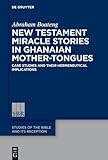New Testament Miracle Stories in Ghanaian Mother-Tongues : Case Studies and their Hermeneutical Implications / Abraham Boateng.
Material type: TextSeries: Studies of the Bible and Its Reception (SBR) ; 25Publisher: Berlin ; Boston : De Gruyter, [2024]Copyright date: 2024Description: 1 online resource (VII, 170 p.)Content type:
TextSeries: Studies of the Bible and Its Reception (SBR) ; 25Publisher: Berlin ; Boston : De Gruyter, [2024]Copyright date: 2024Description: 1 online resource (VII, 170 p.)Content type: - 9783111339788
- 9783111340197
- 9783111340081
- 226
- online - DeGruyter
- Issued also in print.
| Item type | Current library | Call number | URL | Status | Notes | Barcode | |
|---|---|---|---|---|---|---|---|
 eBook
eBook
|
Biblioteca "Angelicum" Pont. Univ. S.Tommaso d'Aquino Nuvola online | online - DeGruyter (Browse shelf(Opens below)) | Online access | Not for loan (Accesso limitato) | Accesso per gli utenti autorizzati / Access for authorized users | (dgr)9783111340081 |
Dissertation Goethe-Universität Frankfurt 2022.
Frontmatter -- Contents -- List of abbreviations -- Chapter One General introduction -- Chapter Two Understanding the African worldview -- Chapter Three Hermeneutics in Western and African contexts -- Chapter Four Translations of 1Kings 18:25–38 -- Chapter Five Translations of Mark 9:14–29 and Luke 7:11–17 -- Chapter Six Reception of miracle stories in the Ghanaian context -- Bibliography -- Appendix 1 -- Appendix 2 -- Appendix 3 -- Appendix 4 -- Appendix 5 -- Index
restricted access online access with authorization star
http://purl.org/coar/access_right/c_16ec
This book examines the translations of selected miracle stories from the Hebrew Bible, Septuagint (LXX) and the Greek New Testament into selected Ghanaian mother-tongues, considering possible shifts of meaning that occur in translating. 1Kings 18:25–38, Mark 9:14–29 and Luke 7:11–17 are used as case studies. The author draws out semiotic-hermeneutical nuances of these texts as they are understood in the Ghanaian context and addresses questions in the field of Biblical studies concerning the relevance of intercultural hermeneutics for current trends in Ghanaian Christianity. Particularly important is the high premium placed on ‘miracles’ in present-day Ghanaian spirituality, making a careful analysis of these stories particularly relevant for the Ghanaian audience. The study also explores several factors that influence the translation process and have a bearing on the reception and use of the text. It follows the growing calls for a shift in African Biblical hermeneutics from the theological heritage of Europe and America to the emerging theological trajectories of Africa. This post-colonial shift re-examines the translated text, moving from what the text might have meant to what the text might mean in Africa.
Issued also in print.
Mode of access: Internet via World Wide Web.
In English.
Description based on online resource; title from PDF title page (publisher's Web site, viewed 20. Nov 2024)


